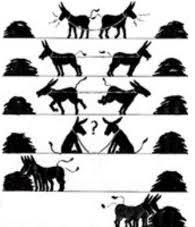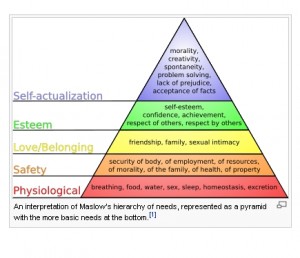HOW DOES THE GAZA-ISRAEL WAR AND OUR REACTIONS TO IT REFLECT IN OUR OWN CONFLICTS?

Like many I have been hugely saddened and horrified by events in Gaza. Throughout my reading and debates, on and off social sites, I noticed that there are three strands of opinions and information being shared.
- One supports and exacerbates the polarization of views and uses incendiary language and generalizations.
- Another seeks to breakdown those generalizations with examples of dissent that promote the existence of moderate thinking on both sides.
- And the third provides examples of current projects and new initiatives based on Palestinian-Israeli cooperation in peace building.
These strands mirror three distinct paradigms that are applicable to how one approaches and interacts in life. Namely:
- Me Vs. You
- Me And You
- Me With You
Taken together, they can provide a useful process of de-escalation and co-operation, be it in the international arena, or in our interactions at work, in the family and socially.
ME VS. YOU:
This attitude has its roots in inequality, which can relate to a real disparity of resources and power, or a sense of inferiority or superiority based on one’s self-esteem. Whatever the reasons, relations are fraught with power struggles, either for equality, or for dominance and control.
Inherent in this dynamic is an undercurrent of envy, deceit and denial, in which information and resources (and affection) are withheld for the sake of control. This increases tensions, which can then result in frequent tit-for-tat clashes that can escalate and de-escalate quickly and often.
On the other hand, this type of relationship can manifest as a long and tense ‘cold war’, in which heated emotions bubble away under the surface of a freezing silence.
This rivalry can result in a disparaging perception of ‘Other’, in which they become the scapegoat for our woes. This attitude helps us justify our increasingly hurtful behaviour towards them and confirm our belief of significantly incompatible differences and goals.
Moreover, our respective allies may feed the conflict by siding with us; possibly also adding their own disparaging comments, labels, and tidbits of ‘information’.
Staying stuck in this paradigm can at best bring a ceasefire until the next incident and can certainly result in mental, physical and emotional exhaustion.
YOU AND ME:
The moment we accept the unsustainability of our conflict, we begin to move out of our combative positions. This can then pave the way towards finding a more constructive way through dialogue.
This does not mean expecting the other to concede, or putting our differences aside in order to get to some quick agreement that can let us ‘get on with it’ – whatever ‘it’ is. On the contrary, truly understanding one another’s position, needs and experience including pain and anger.
In so doing we start to break down the stereotypes and labels and begin to humanise each other. Hearing our respective stories can also help us to move out of ‘me as victim’ towards ‘us as victims’ and edge closer towards empathy. This in turn helps us take responsibility for our actions, realize our own contribution and begin to look at the conflict from each other’s perspective.
This exploration can enhance mutual acknowledgement and consideration and steer us towards cooperation, rather than mutual destruction.
This paradigm requires us to let go of the hardline position of our conflict story and have the courage to humanise ‘other’. Doing so also means taking responsibility for our actions without blame as a reason for them.
If we still find this difficult perhaps imagining ourselves as two kids pointing to one another and saying “you/s/he started it!”, might help us take responsibility as adults!
We may subsequently accept that we are both victims and perpetrators in this dynamic and begin to explore what we can do together to change it.
ME WITH YOU:
A deeper level of understanding enables us to regard each other as partners in the resolution of our conflict and collaborate in building a future that is mutually beneficial. This entails finding ways that best meet our respective needs, as well as those of our future relationship.
Within this framework we start differentiating between needs and wants. In other words, looking at what we truly can’t do without and is based on a human need, and what is based on a desire and/or driven by envy.
In his work Hierarchy of Needs, Abraham Maslow lists the following as shared human needs, explaining that one cannot ‘self-actualize’ for as long as the lower needs are not met.
Authentic and honest communication can help us understand the reasons behind each other’s needs. This in turn can steer us past an all-or-nothing tug of war, towards collaborating in designing a future that is mutually inclusive and based on power sharing.
This paradigm requires us to let go of the wish for a different past and instead move towards forgiveness – an act that can sow the seeds for a lasting peace.
CONCLUSION:
Like any process, these three strands can serve as a roadmap that can help us establish where we are, what’s needed and also how far we’ve come. The risk of a protracted and escalated conflict means that safety and trust are harder to reach, but certainly not impossible.
Indeed, many groups in the Palestinian-Israeli conflict have come together to cooperate on jointly important issues and needs, in a way that have strengthened empathy and compassion, forged friendships and brought forgiveness.
When it comes to our daily lives, unless there is the possibility and choice of a complete severing, we may need to continue to work or live together, or share childcare after separation. Calling for a ‘ceasefire’ in our interpersonal relations can help us address the reasons and needs that lie behind our power imbalance, including our envy, and begin the process of resolution.
When we treat one another as partners in this journey we can increase mutual understanding and connection and change the way we interact. No matter our history, we start to treat each other with respect.





Dear Marina!
Thank you for this very valuable article, important to read for everybody. Monika
Thank you Monika, I’m glad you liked it. Apologies for the delay in getting back to you! Marina